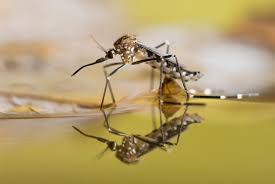Mosquitoes swarming earlier than usual in Spokane

Thanks to an early snowmelt followed by a late and unusually wet spring, the city’s surroundings have become a breeding haven for these pesky insects
SPOKANE
Mosquitoes are making an unwelcome early appearance in the Spokane area this year, and scientists attribute this surge to the prevalence of standing water. Thanks to an early snowmelt followed by a late and unusually wet spring, the city’s surroundings have become a breeding haven for these pesky insects. The result is an explosion of mosquitoes, leaving outdoor enthusiasts grappling with their relentless swarm.
While the weather has favored frogs, which happily feast on mosquitoes, it hasn’t been as accommodating for those of residents yearning to enjoy the great outdoors. Kathy Anson, a concerned resident, recently reached out for answers about this pesky problem. “It has been unbearable this year,” she lamented. “Initially, we thought it was just our area, but after talking with friends and neighbors, it’s clear that everyone is facing significant issues with mosquitoes — they’re simply everywhere. We definitely can tell there’s a difference. And walk outside and especially certain times of the day they’re yeah, they’re bad,” she added.
Dr Laura Lavine from the Department of Entomology at Washington State University explains the cause. “Because we had late spring rains, that is, perfect. Breeding for standing pools of water is a perfect breeding area for mosquitoes,” Lavine said.
Scientists recommend removing standing water from bird baths, water features, and puddles to prevent mosquito development.
“When you’re out and about. Wear long sleeves. The evening time is definitely going to be a time when it’s starting to get dark. That, time of dusk that you really particularly want to be careful,” Dr Lavine advised.
Homeowners can treat yards with bug repellent, but scientists say it’s often only a temporary fix. They recommend bug spray for skin protection.
Scientists say this mosquito swarm may die out soon. However, more types will emerge this summer, so people should not expect them to disappear.
Ends












